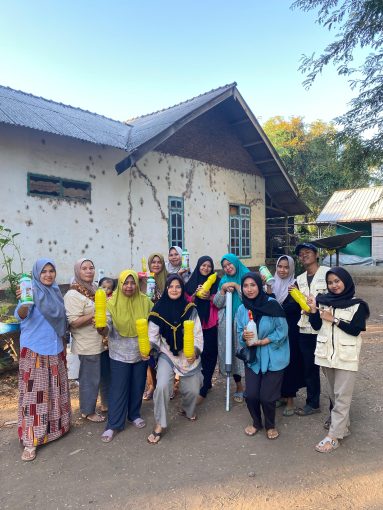
In August 2024, Muhammad Misbahul Anam, a student of the Agricultural Microbiology class of 2021, completed his Community Service-Learning and Community Empowerment Program (KKN-PPM) for the second period of the 2023/2024 academic year in Sugian Village, Sambelia Sub-district, East Lombok Regency, West Nusa Tenggara. The KKN took place from July to August. This KKN activity is one of the compulsory courses that students must participate in. The KKN serves as a platform to apply what has been learned in lectures directly to the community. For Misbah, as the microbiology student is often called, KKN encourages students to connect directly with the community, pushing them, who may have previously been confined to laptops, books, and classroom activities, to immerse themselves in the community, interact directly with residents, solve existing problems, and engage in the surrounding social life. In some scenarios, students may even become involved in those problems, requiring them to solve the issues they face while considering local culture so that the solutions provided by the students can be accepted by the community. The KKN lasted for 50 days. Although it sounds short, Misbah feels that the time was sufficient to provide the experience of living and working directly within the community.
Since the majority of the people in Sugian Village, where Misbah conducted his KKN, are farmers and fishermen, Misbah, as an Agricultural Microbiology student, felt that much of what he learned in college could be applied there. The development of maggot cultivation facilities as a material for producing organic fertilizers and the socialization and mentoring for making POC Ember Tumpuk (stacked bucket organic fertilizers) were two of the several work programs that Misbah implemented. For Misbah, the most important aspect of the KKN work programs is that the knowledge shared through these programs is not only applied during the presence of KKN students but can also be continued by the community in the future, in other words, “sustainable.” Therefore, Misbah coordinated with the village government and the community to ensure that what was done during the KKN could be continued. For Misbah, the success of the KKN programs is inseparable from the support of the community and local government. According to Misbah, the value to be derived from the KKN activity is that differences in ethnicity, race, religion, and culture do not hinder collaboration, mutual assistance, and cooperation in advancing the Indonesian nation.
This KKN program also aligns with Indonesia’s development and growth path, guided by the Sustainable Development Goals (SDGs). The SDGs relevant to the programs carried out are SDG 1: No Poverty, SDG 2: Zero Hunger, SDG 8: Decent Work and Economic Growth, SDG 13: Climate Action, and SDG 15: Life on Land.
Author: Muhammad Misbahul Anam
